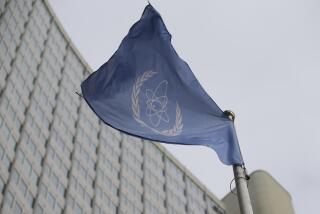U.N.’s Nuclear Watchdog Presses Iran for More Cooperation
TEHRAN — The director of the U.N. nuclear watchdog agency urged Iran on Wednesday to cooperate with the international community and open up its nuclear facilities to tougher inspections.
Speaking at a news conference, Mohamed ElBaradei, head of the International Atomic Energy Agency, said Tehran had agreed to consider signing an additional protocol to the Nuclear Nonproliferation Treaty that would permit unannounced inspections of nuclear sites in Iran.
ElBaradei said a team of experts would visit the country next week to discuss areas that “Iran needs clarification on” and to prepare a report on the protocol meant to encourage Iranian cooperation.
Iran, amid growing criticism from the international community, has remained reluctant to sign the protocol. On Wednesday, officials stopped well short of pledging to sign it, although they appeared to be taking small steps in that direction.
The head of Iran’s Atomic Energy Organization, Gholamreza Aghazadeh, said he too would prepare a report for the Iranian government.
Washington has long alleged that Iran’s civilian energy program is a cover for a clandestine effort to produce nuclear weapons. The discovery of several previously undisclosed nuclear facilities last summer has fueled that suspicion.
Iran, which holds vast reserves of oil and natural gas, insists that it needs nuclear power to supply homes with energy so it can reserve the oil for export.
ElBaradei’s visit fell at a time of particular concern about Iran’s weapons ambitions. This week Tehran conducted a final test of its Shahab-3 missile, which is capable of hitting Israel.
The advanced state of Iran’s nuclear facilities became clear last winter, when an Iranian opposition group presented satellite imagery of sites Iran had not disclosed to the IAEA.
A team from the agency visited some of those sites in the spring and said in a report this month that Iran had processed nuclear material without telling international monitors.
The opposition group, the National Council of Resistance of Iran -- the political wing of the Moujahedeen Khalq, which is considered a terrorist organization by the U.S. State Department -- on Tuesday revealed a site where it said Iran was developing the technology needed to enrich uranium, which can be used to make nuclear weapons.
Western governments have expressed concern that Iran would agree to sign the protocol but then insist on so many conditions that the accord would be in effect a tool to obstruct, rather than permit, tougher inspections. Concerns remain that Iran will find issues to quibble with after the IAEA team completes its report.
“The Iranians are masters of putting the devil in the detail,” said a Western diplomat.
More to Read
Sign up for Essential California
The most important California stories and recommendations in your inbox every morning.
You may occasionally receive promotional content from the Los Angeles Times.










